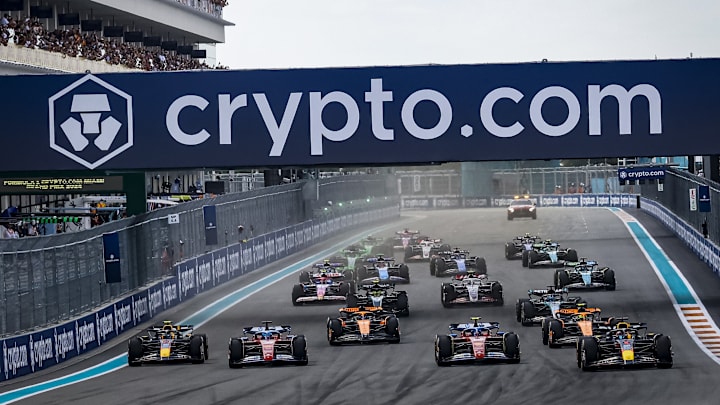"The Greatest Spectacle in Racing" is a phrase that was trademarked by former Indianapolis Motor Speedway owner Hulman and Company in 1986, and for nearly four decades, it has been used to promote IndyCar's -- and the world's -- biggest race, the Indy 500.
Unfortunately, the lack of respect for that trademark has been obvious on multiple occasions when it comes to Formula 1, it's owners Liberty Media, and its United States broadcast partner ESPN.
During driver introductions for the Miami Grand Prix last May, rapper LL Cool J used the phrase "the greatest spectacle in motorsports". The Las Vegas Grand Prix utilized the phrase "the greatest racing spectacle on the planet" to promote its inaugural running in November.
Before the 2024 season began, ESPN put out a trailer featuring the phrase "the greatest spectacle in motorsports". They ironically did so just days after NASCAR posted -- and subsequently deleted -- a promotion for the Daytona 500 in which they referred to the "Great American Race" as the "greatest spectacle in racing".
After Indianapolis Motor Speedway president Doug Boles fought back, stating that "it continues to be disappointing that others can't create their own brand identity without infringing upon ours", ESPN claimed that it was an "unintentional error" and that they had tweaked the promotion after learning of the infraction.
.@ESPN says it tweaked an @F1 2024 season promo that it's been airing in order to remove the "greatest spectacle" line that drew the ire of @IMS, and ESPN adds in a statement: "We revised the ad and apologize for the unintentional error."
— Adam Stern (@A_S12) February 27, 2024
Unfortunately, that appears to have been nothing more than lip service, as the list of pettiness and disrespect grew yet again ahead of this past Sunday afternoon's Miami Grand Prix.
The "Greatest Spectacle" in disrespect
IndyStar journalist Nathan Brown made sure to bring attention to the latest instance of disregard for IndyCar and the Indy 500, again with the use of the phrase "greatest spectacle in motorsport".
Like I said 2 days ago, hold your horses.
— Nathan Brown (@By_NathanBrown) May 5, 2024
Because I guess we’re still doing this. #greatestspectacle https://t.co/Embh544DuI pic.twitter.com/Be1oO6M7if
ESPN's initial explanation was somewhat believable, given that fact that it was indeed only their first slip-up; they weren't responsible for the others. Now, however, there are no more excuses.
When this last cropped up in February, this was @ESPNPR’s statement:
— Nathan Brown (@By_NathanBrown) May 5, 2024
“We revised the ad and apologize for the unintentional error.” https://t.co/9A5Bg660Ze https://t.co/nuaXcOJxWi
In other words, they totally lied and instead decided to continue to use it. Their explanation was nothing more than a way to appease those upset with their blatant contempt.
And until IndyCar or Indianapolis Motor Speedway actually do something about it, they are going to continue to do so. That has now become obvious.
At this point, it is evident that Formula 1 and the elitist culture that surrounds certain circles within it, specifically amid its meteoric rise in the United States, trumps any legal implications regarding trademarks. At least that's what they believe to be true.
In hindsight, the fact that ESPN would have claimed it was an "unintentional error" was a bit of a joke to begin with, and this was pointed out in February after the first infraction.
From February: "Should we expect another 'mistake' of a similar nature in the near future? It's getting quite old."
Yes. Yes, we absolutely should have.
ESPN literally produced live coverage of the Indy 500 from 2007 to 2018. It's laughable that they thought that excuse would fly. Was there really anything unintentional about it? Are they really that clueless?
Now here we are again. At least the Indy 500 doesn't rely on a three-day attendance figure (in which many individuals are counted two or three times) to eclipse the 300,000-person mark. The same cannot be said about Formula 1 or any of its three United States races.
This continued obsession with using a trademarked phrase is just sad at this point. Formula 1 has become so desperate to retain its Drive to Survive-inspired fanbase in the United States that violations of IndyCar and the Indy 500 have become second nature.
They know that if more race fans pick up on what IndyCar has to offer, fans are going to flock toward that, as it features a far more competitive product on the race track. Yet they present themselves as though they believe IndyCar is an afterthought at best. The lack of respect -- and, quite frankly, creativity -- is appalling.
We'll end with the same question: should we expect another 'mistake' of a similar nature in the near future? It is indeed getting quite old.
